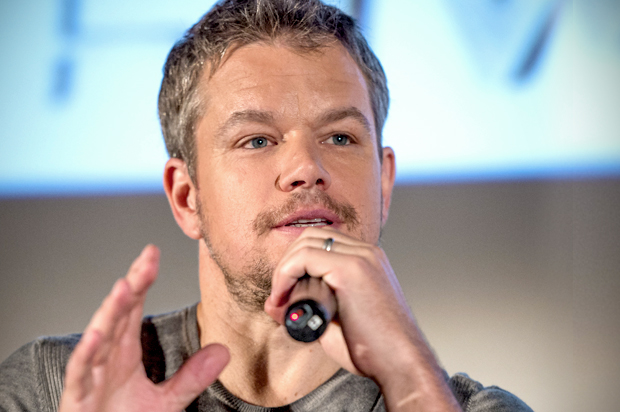By now, news of Matt Damon’s whitesplaining the importance of racial diversity to Hollywood producer Effie Brown has earned him the ire of social media. His gesture generated a lot of criticism for for being rude, which he deserves. More interesting may be the fact that he’s not just rude – he’s wrong. Or at least short-sighted.
Let’s back up. Damon, who has a liberal reputation largely from his environmental work, runs, along with Ben Affleck, “Project Greenlight,” a recently revived HBO show in which an aspiring filmmaker is chosen to make a feature film. Thousands submit short films; from the evidence of the sampling shown in episode one, the technical quality is often better than the acting and writing. despite Affleck crowing about a “quality jump” that’s supposed to be “amazing.”
Assisting Affleck and Damon this time around are the Farrelly Brothers and Effie Brown, an indie producer (who is also African American) who’s had a hand in “Real Women Have Curves,” “Dear White People,” and more than a dozen other films. It’s near the end of the episode, where the show’s regulars are trying to figure out which filmmakers to pick, where things go wrong. Jezebel sums it up nicely:
During a discussion about one of the films, Brown helpfully points out that she’s worried that the only black person in the entire movie is a prostitute who is slapped by her white pimp. All she’s saying is that perhaps this roomful of white people should be cognizant of who they hire to direct a character like that—AKA hire some people of color so they can treat the role with some dignity and prevent it from descending into a racist trope.
“You’re looking at this group right here and who you’re picking and the story that you’re doing,” she says calmly. Luckily, Matt Damon is there to swoop in with this Smart White Man cape and interrupts Brown in order to explain diversity to her and this room full of white people. He argues that actually, the less diverse directing teams brought up the same issue about the prostitute character that Effie is raising.
As Brown tries to describe her position, Damon jumps in again and interrupts her: “When we’re talking about diversity you do it in the casting of the film, not in the casting of the show.”
Brown expresses something like “Ooof! Wow, okay.” She’s clearly not convinced by the idea that the casting room, or the actors — which is what Damon seems to mean — is more important than who’s behind the camera.
Now, maybe the weirdest part of this is the way Damon left this awkward encounter in the episode of “Project Greenlight”; it would have been easy for him to just edit it out. As it is, he let Peter Farrelly, who says something about liking the complex perspective of a white female/ Asian male filmmaking team, look more enlightened than he was.
This is the kind of scene that could have taken place, perhaps, in one of the early seasons of “Project Greenlight.” But the number of reports that have come out lately, showing how white and male even liberal Hollywood remains, makes it resonate a bit strangely. It’s not just acting or directing or any specific part of filmmaking that seems to be whitewashed: It’s the whole thing. It’s an entire system.
A recent USC Annenberg survey, for instance, on 700 of the most popular films from 2007 to 2014, reports that, “In 2014, no female actors over 45 years of age performed a lead or co lead role. Only three of the female actors in lead or co lead roles were from underrepresented racial/ethnic backgrounds. No female leads or co leads were Lesbian or Bisexual characters.” And, “Less than a quarter of all speaking characters were female in the top animated films of 2014.”
Behind the camera, things are also dire. Variety reported, “Over the past 17 years, the number of women directing the top 250 grossing films declined by 2%, according to a new study by the Center for the Study of Women in Television and Film at San Diego State University.” Women now make up only “7% of directors on the biggest moneymakers.”
And Ava DuVernay, director of the Martin Luther King, Jr., feature “Selma,” runs a film distribution collective, African-American Film Festival Releasing Movement (AFFRM), so that filmmakers like her can get their work out. She told Entertainment Weekly:
I think it’s important that other filmmakers have that opportunity and that visibility. We talk about the end game; something like Oscars comes and everyone complains and rightly so—that there is not a more realistic mix of filmmakers, actors, the whole nine yards. But you have to think, “How do you get to that point?” and we can’t get to that point if filmmakers don’t have an opportunity to have their work seen.
Damon may’ve been trying to make the point that race and gender are complicated matters, that surfaces can be deceptive, etc. All true. But when he talks about making the Project Greenlight decision “based entirely on merit” and going with “the best director,” he shows that he clearly hasn’t paid a lot of attention lately.

